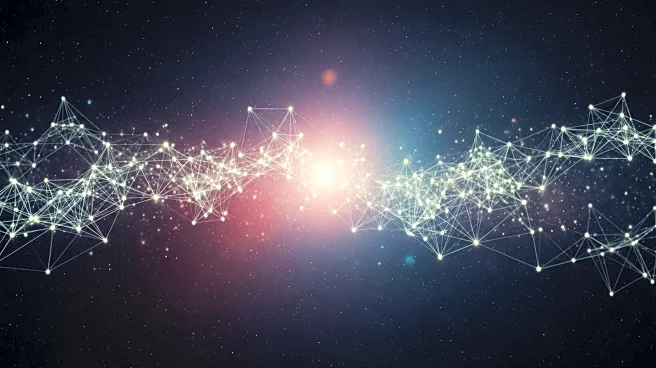What's Happening?
A new theoretical framework, the quantum memory matrix (QMM), has been proposed by researchers to address longstanding contradictions between general relativity and quantum mechanics. This framework suggests that information, rather than matter or energy, is the most fundamental component of reality. The QMM posits that spacetime is composed of discrete cells capable of storing quantum imprints from interactions, such as particle movements or force influences. This concept challenges traditional views by suggesting that the universe not only evolves but also retains a memory of these interactions. The framework offers potential explanations for phenomena like the black hole information paradox, dark matter, and dark energy. According to the QMM, spacetime cells record imprints of matter falling into black holes, preserving information even as black holes evaporate. Additionally, the distribution of quantum information through entanglement may influence the shape of spacetime, potentially accounting for the effects attributed to dark matter and dark energy.
Why It's Important?
The implications of the quantum memory matrix are significant for both theoretical physics and practical applications. By reframing the universe as a cosmic memory bank, the QMM provides a novel approach to resolving deep-seated issues in physics, such as the information paradox and the nature of dark matter and energy. This perspective could lead to a unified understanding of the universe's fundamental forces and components. Moreover, the QMM has been tested on quantum computers, demonstrating practical benefits in reducing logical errors through imprinting protocols. This suggests that the framework could enhance quantum computing technologies, offering improved error correction capabilities. The potential to simulate and test these theories in laboratory settings opens new avenues for scientific exploration and technological advancement.
What's Next?
The QMM framework is undergoing further peer review and testing, with researchers exploring its broader implications for cosmology and quantum computing. Future studies may focus on validating the model's predictions through observational data and experimental simulations. The concept of a cyclic universe, proposed within the QMM framework, suggests that the universe undergoes cycles of expansion and contraction, driven by the saturation of spacetime's informational capacity. Researchers estimate that the universe has experienced several cycles, with more to come before reaching a final phase of expansion. As the framework continues to be refined, it may offer new insights into the universe's age and evolution, potentially reshaping our understanding of cosmic history and the fundamental nature of reality.
Beyond the Headlines
The quantum memory matrix introduces a paradigm shift in how we perceive the universe, emphasizing the role of information as a fundamental element. This perspective challenges traditional notions of spacetime and energy, suggesting that the universe functions as both a memory bank and a quantum computer. The framework's ability to integrate concepts from quantum mechanics and relativity could lead to breakthroughs in understanding the universe's deepest mysteries, such as the arrow of time and cosmic cycles. Additionally, the practical applications of QMM in quantum computing highlight its potential to influence technological advancements, offering new methods for error correction and system optimization. As researchers continue to explore the implications of this framework, it may pave the way for innovative approaches to both theoretical and applied physics.









